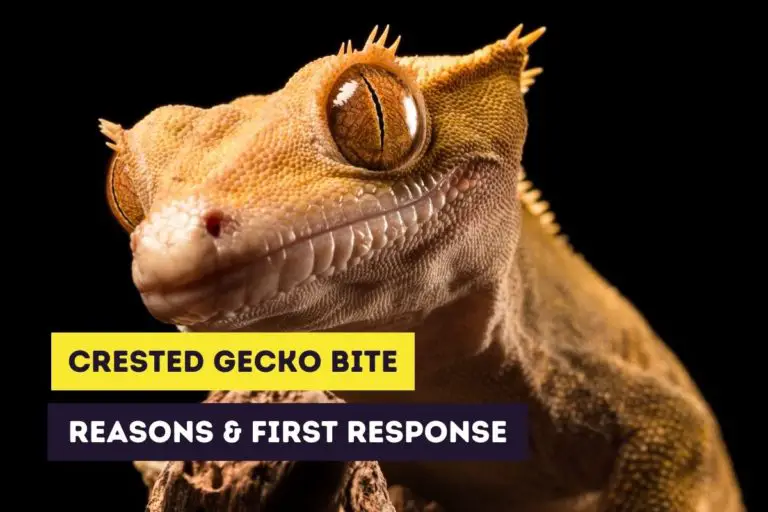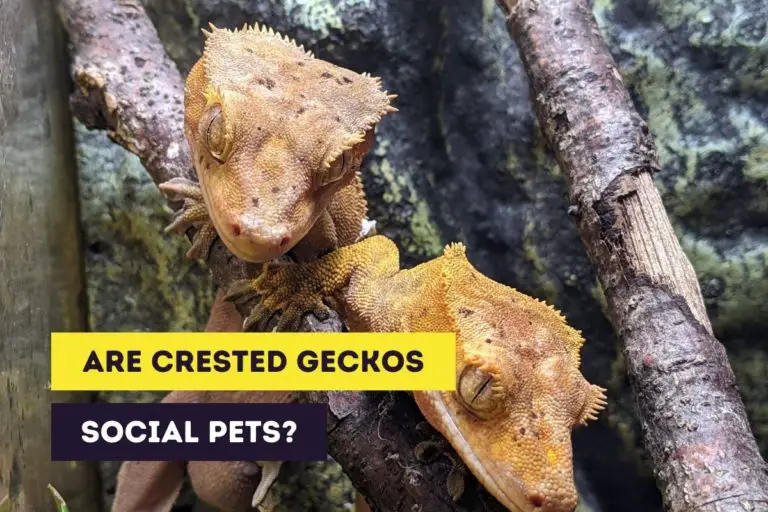Do Crested Geckos Have Salmonella? (Caution Required)
Estimated reading time: 7 minutes
Animals can be the carrier of diseases that we humans can get by interacting or eating them. While you won’t eat your pet, you do have to interact in many ways with them. Reptiles are one of the carriers of the Salmonella bacteria, but does your pet crested gecko carry it?
Crested geckos can be the carrier of the Salmonella bacteria without signs that they’re sick. Always take the proper precautions to prevent transmission of the bacteria to you, your children, or people with weakened immune systems.
While crested geckos can be a carrier of Salmonella, this doesn’t mean that you shouldn’t get a crested gecko. You should be careful when you handle a crestie and when you clean their terrarium. But when you read the rest of this article, you will know what risky behavior is and how you can avoid getting an infection.
If you’re interested in stickers or other products of crested geckos, you can always visit our Etsy Shop, which is called Artful Animalia. We currently only send stickers in the United States. If you’re interested in certain crested gecko-related products, don’t hesitate to contact us.
In this article, you’ll learn what Salmonella is, if all crested geckos are a carrier of Salmonella, and how the bacteria can be transmitted to humans. I’ll also provide you some safety tips to prevent the transmission of the bacteria and some useful links if you want to know more about the infection in general.
This site contains affiliate links to products we recommend and use ourselves. We may receive a commission for purchases that you make through these links. If you’re interested in learning more about our affiliate links, please visit our (affiliate) disclaimer.
What Is Salmonella?
Salmonella is a group of bacteria that live in the intestinal tract of animals. These bacteria cause a bacterial disease called Salmonellosis. You or someone you know might have got Salmonella from contaminated food and such an infection is often called food poisoning in daily life. What is less known is that a Salmonella infection can also be caused by contact with animals.
Crested Geckos and Salmonella
Pets are one of the sources of Salmonella infections in humans and pet reptiles are no exception to this. In fact, research suggested that exposure to reptiles and amphibians is associated with 74.000 Salmonella infections each year in the USA.
So, let’s learn a bit more about the relationship between crested geckos and Salmonella. Luckily for us, there’s a little bit of research that’s being done on the Salmonella bacteria in reptiles and more specific in crested geckos.
Do all crested geckos have Salmonella?
An estimated 90% of all captive reptiles are the carrier of Salmonella bacteria and some of them are “reptile-associated”. There have been some studies about the Salmonella bacteria in reptiles, including in crested geckos as they’re popular pets.
A study in 2016 in Southern Italy found that 22 out of 36 studied crested geckos had a species of Salmonella bacteria. These crested geckos tested positive for the following Salmonella species:
- Muenchen (10 out of 22)
- Hadar (4 out of 22)
- Oranienburg (4 out of 22)
- Eastbourne (2 out of 22)
- S. enterica (2 out of 22)
Another study conducted from 2000 to 2002 in Japan also found high Salmonella infections in reptiles. Although the testing group of crested geckos was only 3 in this study, all tested positive for Salmonella.
There was even an investigation from the CDC in the United States in 2015 when there was an outbreak of Salmonella (Muenchen) infections linked to pet crested geckos.
While not all crested geckos carry the Salmonella bacteria, many crested geckos in captivity do. But it’s not true that all crested geckos carry Salmonella. So you shouldn’t be afraid of getting a crested gecko and you should not get rid of your crestie as their great pets. However, you do have to be hygienic when caring for crested geckos.
How do crested geckos get Salmonella?
Crested geckos can get the Salmonella bacteria the same way we do:
- through their environment (for example, contaminated soil)
- by eating contaminated food
- by drinking contaminated water
But reptiles, including crested geckos, are also thought to be the carrier of certain Salmonella species that are naturally found in the gut microflora (the intestinal tract) of reptiles.
Symptoms of Salmonellosis in crested geckos
One of the most important things to remember is that most crested geckos will carry the Salmonella bacteria without being sick. They usually don’t show any signs that they’re unhealthy, but another underlying disease or even stress is usually causing it when they do.
Diagnosis and treatment of Salmonellosis in crested geckos
Crested geckos will rarely get sick from the Salmonella bacteria. However, when they show any signs of sickness, you should seek the help of a vet that can treat your crestie and give it antibiotics when needed.
Vets will usually discourage treatment when there are no signs of sickness. Using antibiotics can cause resistant Salmonella strains which is not a good thing.
Salmonella Infection of Humans
How do people get salmonella?
You can get an infection with the salmonella bacteria when:
- handling your crested gecko
- coming in contact with the food, water, substrate in the terrarium
- cleaning the terrarium
So you can get infected with the salmonella bacteria when you come in contact with your crested gecko or when you come in contact with objects that were in touch with your crestie. However, you don’t have to handle your crested gecko to get infected, as an indirect infection is also possible.
Who is at risk of getting Salmonella?
Although anyone can get Salmonella and get sick from it, some groups are more susceptible to getting Salmonellosis.
The following groups have a higher risk of developing salmonellosis:
- infants
- children of 5 years or younger
- adults of 65 years or older
- people with a weak immune system (HIV/AIDS, cancer patients,…)
What are the symptoms of Salmonellosis?
People infected with Salmonella might have diarrhea, vomiting, fever, and abdominal cramps. Infants, the elderly, and people with weak immune systems are more likely than others to develop a severe illness which can even lead to death in the rarest cases. Pregnant women should also avoid contact with crested geckos.
Diagnosis and treatment of Salmonellosis in humans
When you get a Salmonella infection the symptoms will usually show within 1 to 3 days and the infection usually lasts between 5 and 7 days. A lab test can determine if a person suffers from Salmonellosis, but there’s little to no need for extensive treatment. However, when you suffer from a Salmonella infection, you have to drink plenty of fluids.
In severe cases, when you get severe diarrhea and the infection spreads to the rest of the body, you’ll need to seek help from a doctor and possibly get to the hospital to rehydrate. In such cases, you’ll need antibiotics to fight the infection.
Safety Tips When Handling Crested Geckos
General safety tips
To prevent getting sick from handling your crested gecko you should always follow these guidelines from the CDC:
- wash your hands: always wash your hands after you handled your crested gecko or got in contact with the inside of the terrarium. You should always do this, especially when bitten by a crested gecko.
- don’t house your crested gecko near the kitchen: the bacteria can be easily transferred onto food. Keep your gecko in a room where food isn’t prepared, served, or consumed.
- don’t clean the terrarium in your bathtub or shower: cleaning the terrarium shouldn’t be done in the bathroom. You should preferably do it outside or in a garage to prevent contamination of your tub and shower with the bacteria.
- never kiss or touch noses with your crested gecko: this only increases the risk of transmission of bacteria.
You should also be wary that indirect contact can also lead to the transmission of Salmonella. For example, the terrarium and objects in it can contain bacteria. Salmonella infections are highly contagious and can stay alive on surfaces for several hours (some species even several days).
Safety tips for vulnerable groups
Vulnerable groups (such as mentioned above) should always avoid direct and indirect contact with crested geckos. So, you shouldn’t house crested geckos in the vicinity of vulnerable people. Childcare or senior centers are not an appropriate home for crested geckos!
In Need of Medical Information?
Since I’m not a medical professional I highly encourage you to read more about Salmonella on the following reputable sources:
- CDC Salmonella website
- WebMD
- Mayo Clinic
Want to Learn More?
If you want to learn more about crested geckos as pets, please read the following articles.
If you’re interested in getting crested geckos as pets you should also definitely read our article about baby and juvenile crested gecko care or (adult) crested gecko care.







